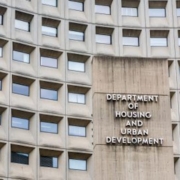Biden’s $1.5 trillion budget calls for big investment in HUD
President Joe Biden’s $1.5 trillion discretionary funding request includes a 15% budget increase for the Department of Housing and Urban Development (HUD) to combat homelessness, retrofit rental housing and increase the supply of affordable housing. But housing industry insiders tell HousingWire that the proposed budget looks unlikely to be passed as currently configured.
In a letter sent to lawmakers on Friday, the Biden administration asked for an additional $9 billion to be allocated to the federal housing agency. If Congress were to rubber-stamp the request, it would put HUD’s budget at $68.7 billion for fiscal year 2022.
The request for HUD, led by Secretary Marcia Fudge, includes a $5.4 billion expansion of housing vouchers to cover 200,000 additional families. Homeless assistance grants would be increased by $500 million, to support 100,000 additional households, including homeless youth and victims of domestic violence.
The budget includes an increase of $435 million in modernization grants for public housing — although the nation’s largest public housing system, the New York City Housing Authority, currently has a $40 billion budget shortfall. Another $800 million would go toward investments in energy efficiency and climate change resilience across HUD’s portfolio of 2.3 million low-income rental properties.
The president’s request would send an additional $500 million to a federal block grant program, the HOME Investment Partnerships Program, which creates housing for low-income households. The funds would be used to construct and rehabilitate affordable rental housing. An additional $180 million would be used to create affordable housing for seniors and persons with disabilities.
How servicers can stay ahead of Biden’s potential regulatory changes
Among the unknowns servicers face in 2021 are changes that could affect lender-placed insurance (LPI). Servicers must have the flexibilities in place to keep up with the latest changes to remain compliant and efficient while still providing an optimal borrower experience.
Presented by: Proctor Loan Protector
The expiration of restrictive federal spending limits, which stem from the 2011 Budget Control Act, presents a “unique opportunity” to reverse the last decade’s trend of disinvestment in non-defense funding, according to a letter to lawmakers Office of Management and Budget Director Shalanda Young.
“Over the past decade, due in large measure to overly restrictive budget caps, the nation significantly underinvested in core public services, benefits, and protections,” Young wrote.
The outlined budget increases are a starting point for negotiations in Congress. But as lawmakers determine how much federal funding to provide to federal agencies, the proposals are likely to go through changes as lawmakers take up the issues.
According to a federal lobbyist for the housing industry who spoke to HousingWire on Monday, there’s “no assurance” this budget would be passed as-is, and will likely be downsized in order to garner bipartisan support.
Vermont Sen. Bernie Sanders, who chairs the Senate Budget Committee, praised the increases in funding for education, health care, environmental protection and affordable housing through HUD.
“At a time when over half of our people are living paycheck to paycheck, and millions of elderly people are experiencing poverty, this budget goes a long way in providing the help that so many Americans desperately need,” said Sanders in a statement.
Senate Republicans have already taken issue with the relatively modest increase in defense spending — $753 billion, a 1.7 percent increase — compared with funding for social services. In order to pass, any federal funding agreement would require the support of at least 10 Senate Republicans.
In a joint statement, Florida Sen. Marco Rubio, Kentucky Sen. Mitch McConnell, Oklahoma Sen. Jim Inhofe, South Carolina Sen. Lindsey Graham and Alabama Sen. Richard Shelby condemned Biden’s proposed budget as “liberal wish list priorities.”
“President Biden has said much about reaching across the aisle,” the statement read. “Both parties should be able to agree that we must maintain America’s edge over China. We urge President Biden to work with us in a bipartisan manner to ensure that.”
Lawmakers have a little less than six months to pass a budget before Oct. 1, the beginning of fiscal year 2022.
In his first six months in office, the Biden administration has taken more interest in housing – specifically, affordable housing – than most administrations in recent history. Separate to his budget proposal for HUD, Biden’s $2 trillion infrastructure plan calls on $213 billion to be allocated for housing, with a focus on low- and middle-income homeowners and prospective homebuyers. That proposal calls for the construction and rehabilitation of 500,000 homes in low- and middle-income areas.
Biden has also pushed for large-scale changes to restrictive zoning covenants in localities across the country, a common barrier to constructing affordable housing.
The post Biden’s $1.5 trillion budget calls for big investment in HUD appeared first on HousingWire.




 :215-447-7209
:215-447-7209 : deals(at)frankbuysphilly.com
: deals(at)frankbuysphilly.com